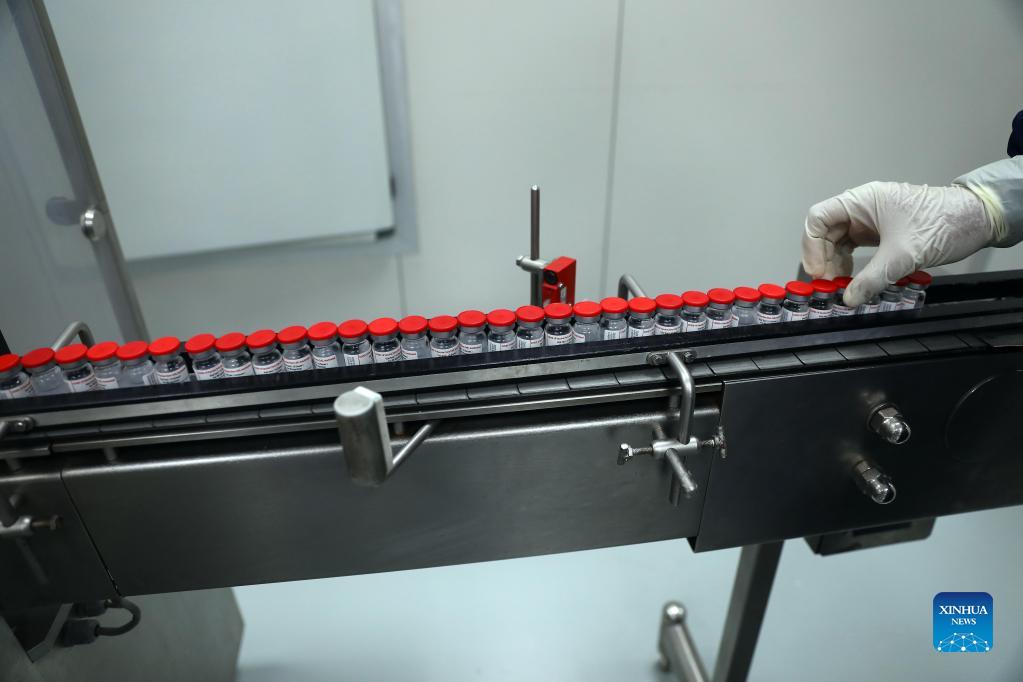
Photo shows COVID-19 vaccines on the vaccine production line of a VACSERA factory in Giza, Egypt, Sept. 6, 2021. The factories of Egypt's state-owned vaccine production company have been working nonstop over the past few months to locally manufacture millions of doses of Chinese COVID-19 vaccine Sinovac, as the most populous Arab country eyes becoming a regional hub for vaccine production and exportation. (Xinhua/Ahmed Gomaa)
by Mahmoud Fouly, Emad al-Azrak
CAIRO, Sept. 7 (Xinhua) -- The factories of Egypt's state-owned vaccine production company have been working nonstop over the past few months to manufacture millions of doses of COVID-19 vaccine Sinovac, as the most populous Arab country eyes becoming a regional hub for vaccine production and exportation.
The vaccines are being produced by Egyptian Holding Company for Biological Products and Vaccines (VACSERA) as per an agreement signed in April with Chinese biopharmaceutical company Sinovac.
"Due to the COVID-19 pandemic and in response to the global need of vaccines, we prepared 'Factory 60' inside one of the factories and production lines of VACSERA to produce COVID-19 vaccines in partnership with China's Sinovac," said Egyptian Health Minister Hala Zayed in a recent tour inside VACSERA factory in Agouza district of Giza province near downtown Cairo.
The minister pointed out that the Sinovac production line inside VACSERA factory in Agouza can meet the local needs of vaccines with a production capacity of 200 million doses annually.
In the vaccine production line of VACSERA factory in Agouza, hundreds of little bottles with red stoppers are carried by conveyors to machines to be filled with the jabs, then go through a labeling process before being packed in boxes by workers dressed in white and sky blue coats and wearing gloves, medical face masks and disposable headcovers.
The final product, which carries the VACSERA-Sinovac label, is then kept in refrigerators for adequate preservation.
"We can control and immediately deal with the refrigerators in case of any breakdown. The refrigerators are connected with a generator and an uninterruptible power supply. So, we're 100-percent reassured that nothing could happen to affect the quality of the vaccine," Heba Wali, head of VACSERA, told Xinhua.
She added that a delegation from the World Health Organization visited the factory in September 2020 and praised its capabilities.
Meanwhile, a new VACSERA factory complex in Giza's 6th of October City west of capital Cairo will include a vaccine production factory to be opened later this year and will be able to cover Africa's need of vaccines with a production capacity of about 1 billion doses per year, Zayed told reporters.
It is built on a total area of 60,000 square meters, of which 6,000 square meters are dedicated to the COVID-19 vaccine factory that is expected to be inaugurated in November.
The factory is equipped with eight high-tech labs and a warehouse area in accordance with international standards.
"We aim to transform Egypt into a regional center for vaccine and serum production, especially coronavirus vaccines, based on our technological, scientific and industrial capabilities," VACSERA chief said, hailing cooperation and exchanging expertise with China and its Sinovac firm in this regard.
For his part, Mohamed Hassani, Egyptian assistant health minister for public health initiatives, said that since VACSERA and Sinovac signed their partnership agreement, the Chinese side has sent experts to assist Egypt until the production of the first batch of vaccines was successfully completed.
The official emphasized "the strength and depth of the Egyptian-Chinese relations" which have witnessed great momentum and growth in recent years.
"The Chinese government strongly supports the manufacture of COVID-19 vaccines in Egypt," Hassani told Xinhua, describing the partnership between VACSERA and Sinovac as "the fruit of cooperation" between Egypt and China in fighting COVID-19. Enditem